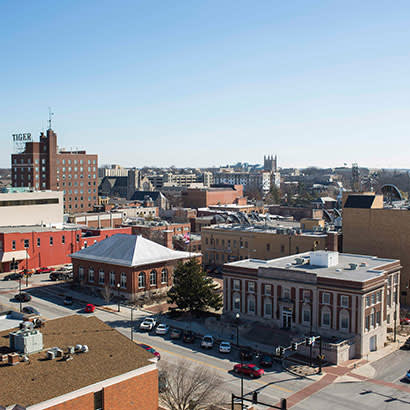
Pictured: The skyline of Columbia, Missouri. Photo by Shaefer Photography.
According to a UBC Sauder School of Business study, teens in part-time jobs are more likely to find suitable employment and earn more money in the future than those who did not work during the summer. Sauder professor Marc-David L. Seidel and his co-authors found that teens in part-time jobs progress to better-suited careers because early exposure to work helps them enhance their essential skills.
The City of Columbia, Missouri, has a career readiness program, Career Awareness Related Experience (CARE), which is part of the Columbia Parks and Recreation Department. It aims to prepare Columbia’s youth to enter the workforce and become productive, self-sufficient citizens by providing comprehensive services that include essential skill development.
CARE trainee Lydia Broadus learned several essential skills during her time in the program. “Participating in the CARE program helped me in many ways to better prepare me to be successful in the workforce,” Broadus said.
One of the biggest things Broadus learned was how to conduct herself professionally in the workplace. This included learning to interview professionally at the age of 15 and learning about workplace etiquette, timeliness and how to update her employer if she was late or sick.
“I gained experience interacting healthily and professionally with coworkers,” Broadus said. “I learned so much responsibility and how to have pride in my work and serve those around me. The CARE program allowed me to grow in a safe environment as I built the skills needed for the workforce and improved my professionalism. Instead of making first-time mistakes in the workforce, I was given guidance and support before I got there through the CARE program.”
Essential skills are the skills that make us effective in any workplace or life situation, from effective communication to problem-solving and time management. They are universally beneficial. For Broadus, these included interviewing, workplace communication, professional conduct and more.
Some examples of essential skills are:
- Communication
- Teamwork
- Adaptability
- Critical thinking
- Problem-solving
- Time management
- Leadership
- Conflict resolution
- Emotional intelligence
- Interpersonal skills
- Organization
Supervisors usually consider essential skills more important than hard skills for entry-level positions. They want new employees to have strong essential skills, and then they will teach them the necessary hard skills.
The CARE program focuses more on essential skill development rather than technical expertise and knowledge. In job readiness training during the spring, CARE trainees learn the importance of essential skills. During the summer, they strengthen their essential skills with paid, real-world, hands-on work experience.
The essential skills trainees develop at work sites are not only valuable in the immediate context but also directly transferable to other work settings. While they also learn hard skills at work sites, these skills are often not transferable to other work settings. The essential skills they learn are universally applicable, making them valuable assets in any career path.
Five years after completing the CARE program, Broadus returned to the program as a job coach who could encourage, support and help youth grow. She walked trainees through conflict management in the workplace, reminded them to communicate well with their employer, and gave advice on how to be a professional employee. She also had the privilege of seeing many trainees hired by the company for which they were trainees during the summer!
Focusing on essential skills is important to ensure the success of a workforce development program. To learn more about essential skills, check out NRPA’s workforce development resource guide and workbook.
Ron Schmidt is the City of Columbia, Missouri’s Career Awareness Related Experience (CARE) program supervisor. The CARE program is part of the Columbia Parks and Recreation Department.


